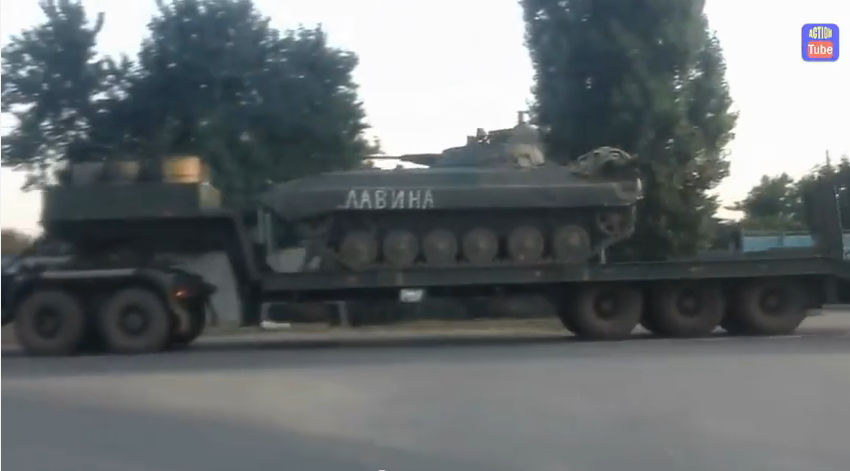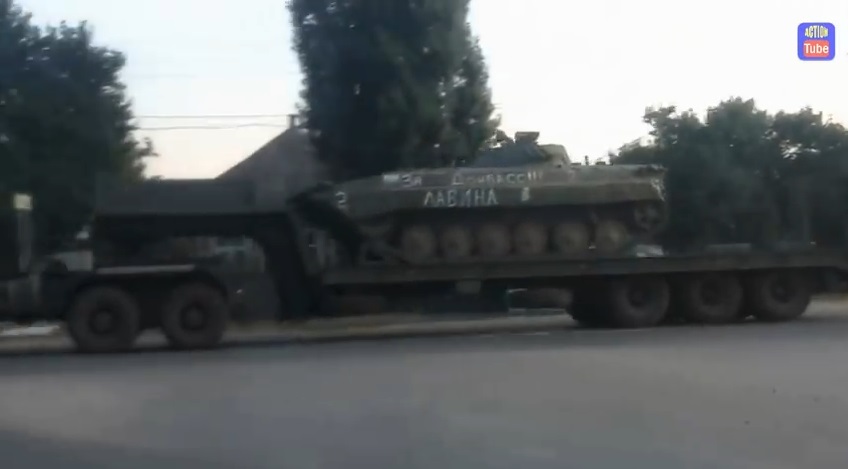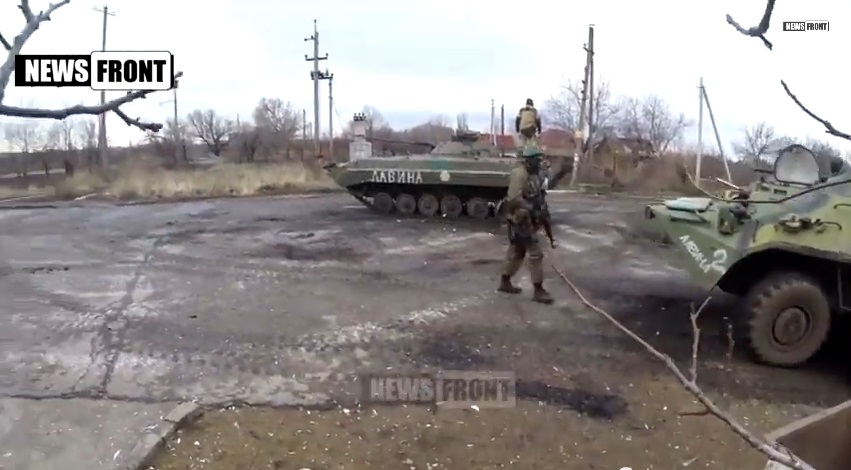Yesterday’s live coverage of the Ukraine conflict can be found here. An archive of our liveblogs can be found here. For an overview and analysis of this developing story see our latest podcast.
Please help The Interpreter to continue providing this valuable information service by making a donation towards our costs.
For links to individual updates click on the timestamps.
For the latest summary of evidence surrounding the shooting down of flight MH17 see our separate article: Evidence Review: Who Shot Down MH17?
Ukrainian bloggers have noticed that armor shown in a video matches armor in Russia, and may indicate proof that convoys spotted near the Ukrainian border inside Russia to end up deep in Ukraine — a point that has already been proven multiple times before, including in our post in recent days about Russian Strela-10s, Uragans, BPM-97s and other armor only in the Russian arsenal in Ukraine.
Translation: The “Lavina” BMP-2 of the Rashisty in Uglegorsk. The same one that in August was brought through Kamensk-Shakhtinsk.
Rashisty is a pejorative term for Russians, combined with the term “fascists.”
Lavina means “avalanche” in Russian.
The Ukrainian news site Informator.su reported the match.
A video showing a convoy in Russia was uploaded by some teenagers in August and copied by Action Tube. It was believed to be in the town of Kamensk-Shakhtinsk because of the stores and railroad overpass, although we have not geolocated it:
Some of the vehicles on the trailers have the Russian word Lavina on them, also with area painted over in green, and one also with the slogan “To the Donbass!”
Lavina could mean the name of an operation, or a unit, or simply convey the idea of an onslaught, it’s not known. Identifying insignia on Russian tanks are often painted over in green, and it’s common for the Russians and Russian-backed separatists to paint an aspirational destination on the side of tanks.


The same slogan Lavina was on armor spotted in Uglegorsk (Vulehirsk) in this video uploaded by News Front on February 3 titled “Clearing of Uglegorsk. Special Operation by Militia.”

While it’s possible to paint or over-paint anything on a tank given by Russia to militants in Ukraine, the distinct similarity of the painted slogan and the armor in Russian and then later Ukraine deserve closer study.
— Catherine A. Fitzpatrick
President Petro Poroshenko’s speech at the Munich Security Conference has been posted on the presidential web site in English.
Some highlights:
– Poroshenko recalls his participation in the conference last year right after Yanukovych government snipers shot and killed 100 Maidan demonstrators, when he still believed the international community might respond:
I felt so proud then, because Ukraine had reminded Europe and the world that democracy and values are worth fighting for.
That was a time when we believed in international law.
The confidence that territorial claims, aggression, a right of might belonged to the past, at least in Europe.
But now, this confidence has been shattered.
The year 2014 rolled the time back – decades, if not centuries.
President Poroshenko then highlighted all the suffering brought by the Russian invasion of Ukraine, holding up the passports of the Russian citizens and others found fighting against Ukrainian forces:
The border routes, once used for
transporting goods and exchange of visitors and friends, are now
swarming with Russian tanks, armed personnel carriers, artillery,
multiple-rocket-launchers and ammunition.
How many evidences does the world still need to recognize an obvious
fact – there is a foreign military equipment, mercenaries, Russian
military coaches and regular troops.
This last year has become a spiraling tragedy for my nation.
The death toll of the Ukrainian soldiers defending their land from aggressor is constantly rising.
Here there is the passports and documents of Russian soldiers and
officers who came to us and “got lost” their way. This is the best
evidence of the presence of Russian troops which killing Ukrainian
soldiers and Ukrainian civilians.
Thousands of people have been killed since last April.
More than ten thousands wounded.
Hundreds and thousands of civilians have become innocent victims of terrorists financed, trained and equipped by Russia.
298 innocent victims of the downed MH17 flight; 16 killed in a bus
shelled in Volnovakha, 8 dead in a trolleybus shelled in Donetsk; 31
civilian casualties of Mariupol shelling by Russian-provided rockets.
Poroshenko tried to invoke the recent memory of Soviet Russian aggression against East Europeans:
The aggression against Ukraine has opened a Pandora’s Box for the international security.
It must be clear that there are no temporary solutions. This conflict must be resolved, not frozen.
It is now clear that if Ukraine does not succeed in restoring peace
and its territorial integrity, the revision of borders, spread of
terrorism, humanitarian and technological disasters, flexing of nuclear
mussels will continue.
It is a pleasure to share this panel with my friends – the Presidents of Bulgaria, Finland, and Lithuania.
If there are not many Finns who still remember Russian aggression,
there are many Lithuanians who still mourn their loved ones lost in the
fight for their independence against the Kremlin.
And I am sure that the majority of Bulgarians still remember the
realities of socialism and would never go back to the Moscow orbit
again.
Today Ukraine has to fight for its independence and its freedom. We must defend our land.
Then Poroshenko re-invoked the Minsk peace plan and clarified something that has been a repeated point of Russian disinformation and misrepresentation — the Law on the Special Status of Donbass. Contrary to claims that this law has been revoked by Ukraine, Poroshenko not only reaffirmed it by saying it was “passed” and not revoked (despite his threat to do so), but drew attention to the fact that it was the Russian-backed separatists who broke the Minsk agreement by holding unauthorized and unrecognized elections:
As a President of Peace, I presented my
Plan. Its logic is laid down in the Minsk Protocol signed on the
September 5, 2014 by representatives of Ukraine, Russia, the OSCE and
the separatists.
These are very concrete steps to restore peace and facilitate the political dialogue.
We immediately declared the ceasefire and signed the Memorandum on
the line of disengagement and withdrawal of heavy weaponry on September
19, 2014.
We were ready to hold a political dialogue with those parties who are
credible to represent Donbas based on the democratic approach –
elections.
The Ukrainian Parliament passed the Law to provide wider authority to
regional, municipal and local authorities of parts of Donetsk and
Luhansk regions, and it passed the Law on Amnesty.
We will never recognize fake elections held by separatists on their
controlled territories on November 2 under the barrels of machine guns.
I would like to stress that a non-military and diplomatic solution
remains the only remedy to this situation. And I would like to reiterate
that the Minsk Protocol and the Minsk Memorandum are still on the
table.
We want to stop the bloodshed and are ready for an immediate – but
bilateral – ceasefire, to be monitored and verified by the OSCE.
Poroshenko made it clear that he doesn’t oppose elections per se in the Donbass, but that autonomy doesn’t mean secession, and that these elections must take place under Ukrainian law — and not at gunpoint, as both referendums in Crimea and the “People’s Republics” referendum and unrecognized elections have taken place in the last year:
We urge the withdrawal of weaponry, the closing of the border, and the release of all hostages, including Nadia Savchenko.
Once there is no threat of an offensive operation, we stand ready to
hold local elections in Donbas under Ukrainian legislation and the
observation of the OSCE/ODIHR.
We are committed to continuing the further political dialogue with the democratically elected representatives.
We have started Constitutional reform with the aim of continuing the
decentralization process and yielding wider administrative, financial
and cultural authorities to the regions.
We are stripping our members of parliament and judges of immunity and are conducting rigid anti-corruption reforms.
These efforts are parts of a comprehensive process to restore the
confidence of the Ukrainian people in their institutions and make the
world believe in Ukraine.
Finally President Poroshenko invoked the late German leader Richard von Weizsacker, first president of re-united Germany:
It was President von Weizsacker who, in
his letter addressed to my predecessor Leonid Kravchuk on December 26,
1991, recognized our independence.
Once he said that “the German question will remain open as long as the Brandenburg Gate is closed.”
In the spirit of these words of a great German mind, I would simply
like to reiterate that the Ukrainian question will remain unsolved as
long as the hearts of people and politicians in the West are closed to
providing solid, practical support to strengthen Ukraine’s independence
politically and economically, but also militarily.
Ukraine greatly needs defensive military support to ensure the ceasefire and contain the aggression.
I know many experts have argued that enhancing us militarily would
provoke further aggression. On the contrary, we have seen that the lack
of defense capabilities triggers offensive operation against Ukraine and
spins the escalation.
Over the course of the conflict we have proven to be responsible and that we will not use the defensive equipment to attack.
— Catherine A. Fitzpatrick
President Petro Poroshenko spoke at the Munich Security Council today, urging a rapid cease-fire, and calling for the West to give Ukraine defensive weapons, AP and other wire services reported. AP reports:
Petro Poroshenko spoke amid a
hectic flurry of diplomacy. Hours earlier, German Chancellor Angela
Merkel said she’s still unsure of reaching a deal to calm the crisis,
which France’s president said could feature a broad demilitarized zone
and greater autonomy for Ukraine’s separatist eastern region.Merkel
and French President Francois Hollande, fresh from trips to Kiev and
Moscow, plan to discuss the proposals in a phone call Sunday with
Russian President Vladimir Putin and Poroshenko.The
aim is to draw up a possible joint document on implementing the
much-violated September peace plan concluded in Minsk, Belarus. That
agreement also featured a demilitarized zone, though the battle lines
have since changed, and the government in Kiev has offered a measure of
autonomy to the separatists.Poroshenko
told the Munich Security Conference that Ukraine stands ready for a
“comprehensive and immediate cease-fire” and Russia should be too.He
indicated he didn’t want any peacekeepers in eastern Ukraine, saying
they wouldn’t be needed if foreign fighters were withdrawn and the
Ukraine-Russia border sealed. Then, he said, there would be “peace and
stability in Ukraine … within a couple of weeks.”
Poroshenko said he didn’t want the war in Ukraine to turn into a “frozen conflict” like others in the region kept unsolved by Russia, such as with the breakaway Transdnistria Republic in Moldova.
But the West is unlikely to supply any lethal weapons, although non-lethal equipment has been donated. AP reports:
The resurgent fighting has
prompted the U.S. to consider giving lethal weapons to Ukraine, an
option opposed by European nations which fear the move would merely make
the situation worse.“The
problem is that I cannot imagine any situation in which improved
equipment for the Ukrainian army leads to President Putin being so
impressed that he believes he will lose militarily,” Merkel said. “I
have to put it that bluntly.”